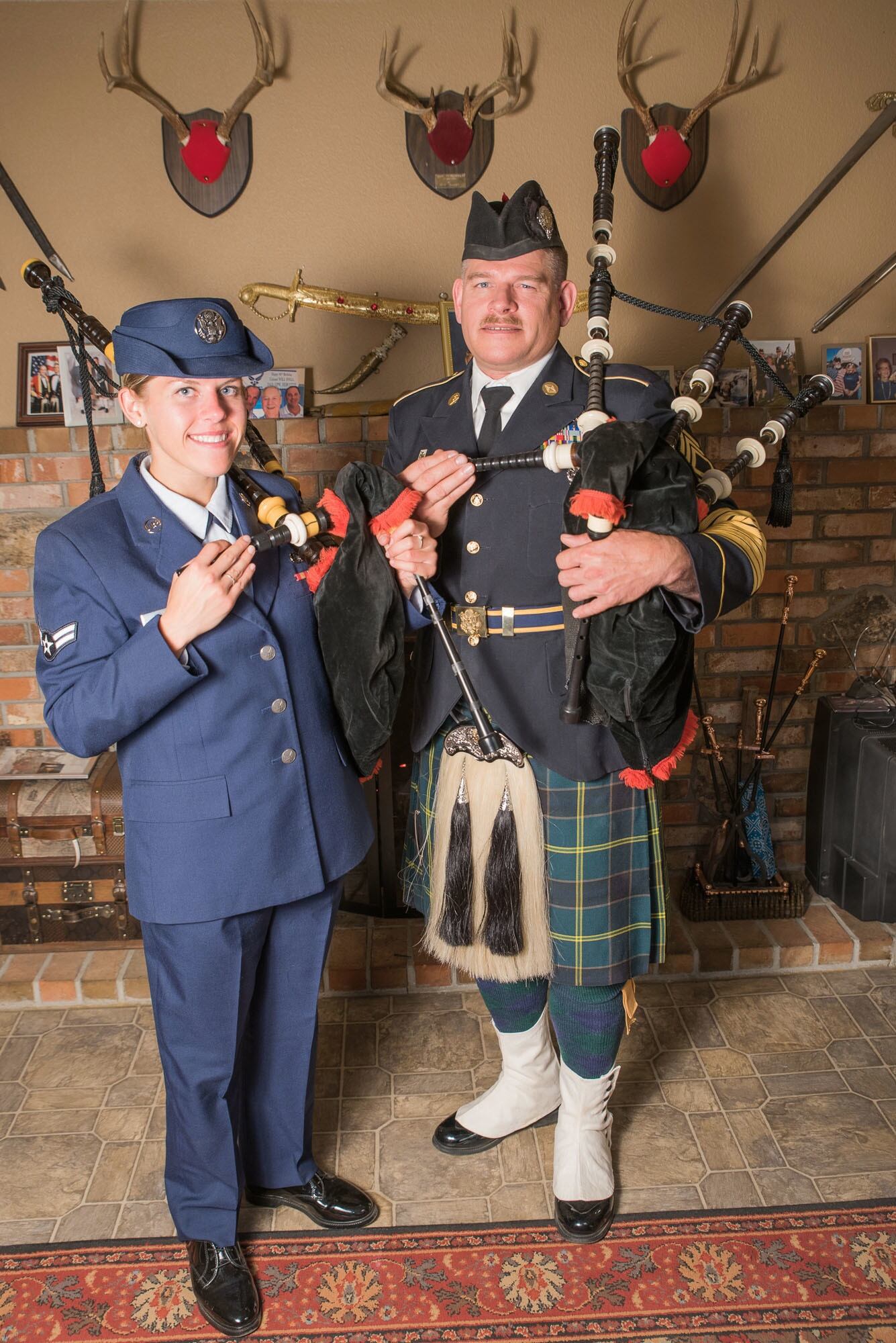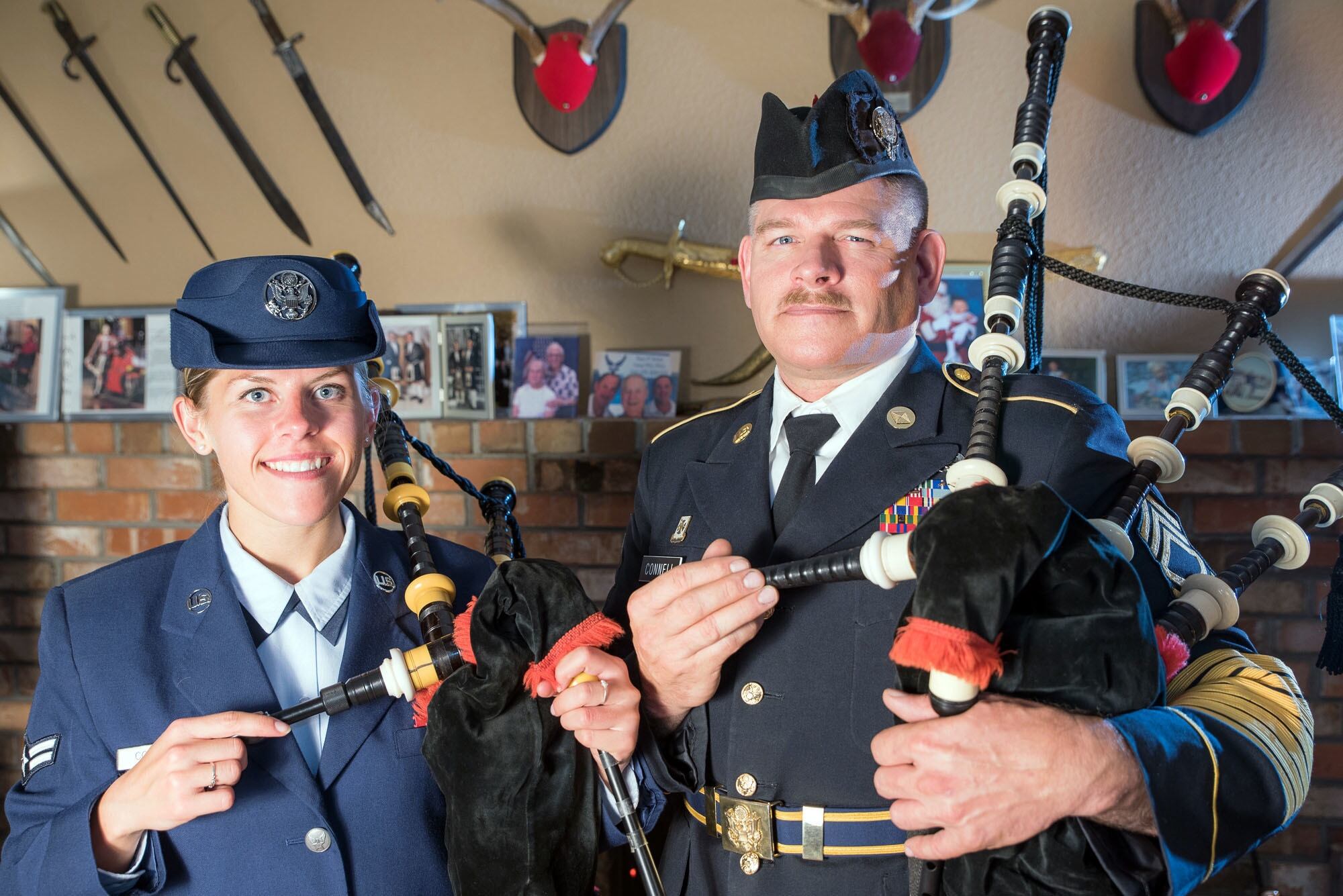RENO, Nev. — During Operation Desert Storm, Sgt. 1st Class Michael Connell practiced his bagpipes outside every day. He practiced at a Kuwaiti military base, while wearing his kilt, sporran, dress shoes and other traditional Highland dress. He remembers one particular day when a large group of U.S. Marines swarmed around him to listen. Normally, that's when he hears, "What's under your kilt, har har?"
"So I stopped playing for a moment and said, 'Got any questions, fellas?' and they said 'No, keep playing, Sarge.' "
So he did. Connell said he felt like the Pied Piper of Hamelin, leading rats out of the city. He said it didn't matter what he played either — marches, drills, jigs, dances — the Marines stood, transfixed.
"Off in the distance, there's some jughead who came out and he started doing some funky Wing Chun Kung Fu," Connell said. "It's very animated and arm flailing. I thought to myself, 'That guy is a little touched.' "
At the time, Connell served for the Nevada Air National Guard. Now he serves in the U.S. Army. Connell, the only military bagpiper in Nevada, will retire by the end of this year, reported the Reno Gazette-Journal.
He connects with the music and history of bagpipes in wartime. He knows the history of the pipes well and knows they have motivated infantry soldiers through the centuries. He points out, with glee, that bagpipes are also the first instrument legally classified as a weapon of war (they were later downgraded to instrument of war).
"It almost gets me emotional, playing this type of music for these types of people," he said. "And they get it. It stirs your soul. It's part of your being. When I'm playing and playing well, I become consumed by the music that I'm playing and it's incredible."
After he retires, his daughter, 23-year-old Air Guard Senior Airman Mariah Connell, will take over as the only military piper in Nevada.

Air Guard Senior Airman Mariah Connell and her father, Sgt. 1st Class Michael Connell pose for a photo holding their military bagpipes in Reno, Nev. Michael Connell served for the Nevada Air National Guard, and now he serves in the U.S. Army. Connell, the only military bagpiper in Nevada, will retire by the end of this year, reported the Reno Gazette-Journal. After he retires, his daughter, Mariah Connell, 23, will take over as the only military piper in Nevada.
Photo Credit: Mike Higdon/The Reno Gazette-Journal via AP
To commemorate the passing of the pipes, Michael filled two silver cups — called a quaich (pronounced quake)— with Laphroaig 10-year Scotch. He toasted his daughter and quickly downed the whisky, then held the quaich over his head to show that he emptied it. He obliged Mariah to do the same.
"My chest is burning," she said after finishing her whisky and flipping the quaich over her head.
She hopes to receive official recognition for her new position other than drinking Scotch. Becoming the only military piper in the state also came as a surprise because she didn't expect her father to retire so soon.
"Taking my dad's place wasn't part of the plan, it just kind of happened," Mariah said.
Mariah started playing bagpipes at age 8 because she saw her father giving lessons to other people and thought it look fun. She stopped playing a few times over the last decade. She said reading about her father in the Reno Gazette-Journal a few years ago inspired her to start playing again. When a family friend and fellow airman died last year, she played at the memorial while her father was out of town.
"I felt like it was an honorable thing to do," she said.
Now she feels compelled to carry on the legacy.
"She's filling my shoes and she's actually a really good piper," Michael said.

Air Guard Senior Airman Mariah Connell and her father, Sgt. 1st Class Michael Connell pose for a photo in a living room holding their military bagpipes on Nov. 7, 2016, in Reno, Nev.
Photo Credit: Mike Higdon/The Reno Gazette-Journal via AP
Portraits, medals, awards and war memorabilia adorn the walls, tables and display cases throughout Michael's house. Numerous bagpiping awards hang in the Connell home. Many more awards hang on Mariah's side of the wall. Michael beams with pride when he shows off his daughter's work. He joked that she's better than him because he taught her. But also because her nimble, young fingers allow her to play faster and more accurately. Mariah also runs, which she said makes the bagpipes a breeze.
"I'm kind of proud because her career is taking off," he said. "This is about passing the torch and following tradition."
Mariah works as a part-time guardsman while going to school. She manages airplane maintenance schedules and compliance, and hopes to graduate from the University of Nevada, Reno, then pursue a full-time commission.
Mariah follows a long line of military succession in her family. Her mother, Air Guard Master Sgt. Suzanne Connell and Michael both said their grandparents, parents, aunts and uncles served in different U.S. and German military branches as far as back as WWII. Michael said his older brother was one of the only family members on his side who did not.
Mariah's younger sister, Caitlyn Connell, also wants to join the military to become a pilot.
Suzanne and Michael will retire on the same day.
Michael said he started looking for agriculture jobs already and plans to work on a ranch away from home for a while. He said he loves "cowboying around," working with livestock and using his new agriculture sciences degree. The walls of his house, in addition to military medals, are decorated in Western photography, paintings and tack. He owns a vintage military saddle that he's afraid will no longer fit modern horses.
"I got into it because I was over-romanticizing being a cowboy," he said. "But I fell in love with it; it's the same people I left in the military."
Michael found a kinship with farmers and ranchers during his time between the Air Guard and Army. He said farmers and ranchers understand what it takes to work hard without complaining, just like military personnel.
"(The military) is about discipline," he said. "It's some of the best people I've ever met in my life."
He said soldiers and para-military first responders are the type of people who run toward danger instead of away from it. They take care of each other.
"We gave our lives for this country and some people don't have what it takes to do that," he said. "It's not about God and country. It's about that person next to you — or those people next to you — that you're fighting for."
Suzanne, Mariah and Michael all said the military changed their perspective on civilian life, too. They sacrificed privileges for other peoples' privileges in civilian life, they said. While Michael slept on cots, in a tent in the Middle Eastern desert, people at home can complain about the internet not working or some other "nit-noy," he said. For them, these nit-noys of life, don't matter.
He said it's hard for him to be around those attitudes after years of service. It's why he wants to go out and work the land. He said farmers and ranchers don't let those nit-noys get to them either.
Michael's long-term goal is to rejoin the rancher life then work his way toward running a cattle operation. But since neither daughter nor Suzanne want to run a ranch after he dies, he said he'll lease the land and buy the cows so they can liquidate it quickly.
In the meantime, he said he'll try out a few new things he's never done before, such as growing out a handlebar mustache and experimenting with antique photography.




